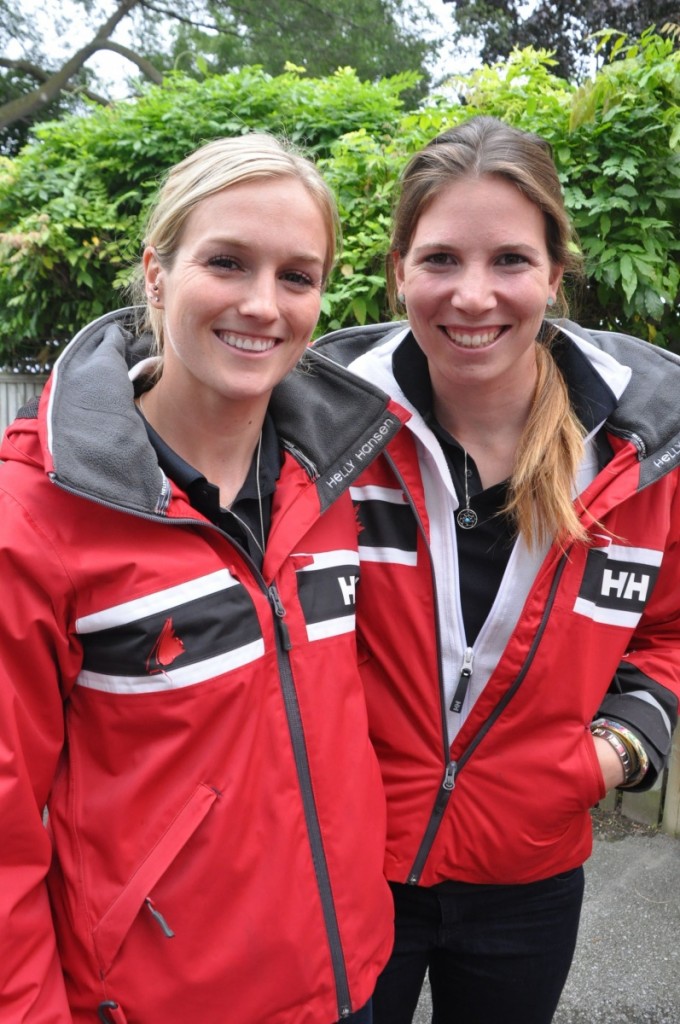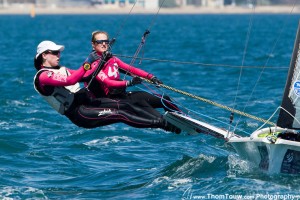
Erin Rafuse (left) and Kingston sailor Danielle Boyd are wintering in Florida as they continue their quest for a berth on Canada's 2016 Olympic sailing team. — teamrafuseboyd.com photo
Danielle Boyd says she prefers not to think about outcomes.
“I’m a person who can’t think too much about results,” Boyd said, “or I become too results-oriented, and I would crack under the pressure.
“I just don’t think about it, and then I can perform better.”
It’s an interesting observation from Boyd, the Kingston sailor who aspires to represent Canada at the 2016 Olympics in Brazil. In high level competitive sailing, a sport where such minor details as progression and funding depend on outcomes, it’s suggested that there must be a trick to being peacefully oblivious.
Turns out, there is.
“I don’t look at the scoreboard,” Boyd said, and when you listen to her explain the philosophy, it does seem to make sense.
“If you’re in a fleet of 25 boats,” she began, “if you are winning the races, it doesn’t matter; you’re excited anyway, but if you’re not winning the races it’s easy to not know where you finished in a race. I just don’t focus on where we are in the fleet; I just focus on my job and if I do my job right, we finish as well as we can.
“Then, when we get off the water, I stay away from the notice board. That’s Erin’s task.”
Erin Rafuse is the skipper of the 49erFX boat on which Boyd is the crew. Based in Halifax, where Boyd attended Dalhousie University, the two are preparing for a busy year as they attempt to qualify for the Olympics.
“We’re halfway through it,” Boyd said during a visit home before Christmas. “Every time I think about how it’s about to be 2015 it’s kind of scary, (to think) that it’s almost 2016.”
Boyd admits that her method of keeping, er, an even keel emotionally is unorthodox.
“It’s not a proven philosophy,” she admits, “but it’s something I used to do with my young sailors when I coached. They would become so results-oriented, and it wasn’t what they were supposed to be working on. (Everyone thinks) ‘I want to know where I finished,’ but as soon as you look at it you could get upset and then you start thinking about it when you’re racing: 'There’s that many boats ahead of me and that many boats behind me …' and it’s easy to count points.
“Kids who were trying to qualify for something, I’d say, ‘Let me take care of the points and until the second-last day, when you have to know where you stand, you’re not going to know where you stand.’ It was something that worked well for them and so I thought maybe I should try it for myself.”
Boyd figures if you find yourself counting points, it inevitably means you’re not concentrating sufficiently on what you should be doing in the boat.
“I’d rather (think about) the boat right there, in front of me,” she said. “I want to beat that boat so I’m going to make this boat go faster than that boat, and then maybe we pass six boats, because I’m focused so much on being faster, which is my job: to make the boat go faster.”

Danielle Boyd, left, in white hat, and skipper Erin Rafuse compete in an ISAF race in 2013 off Huyers, France. — teamrafuseboyd.com photo
“We had a really good first day,” Boyd recalled, finishing second in the first race and surviving “kind of a tough situation in the second race.” They finished sixth in Race 3 of the series, but they were taken to the protest room by an opponent who alleged a start-line violation and ultimately they were disqualified. That relegated them to the consolation fleet, temporarily scuttling their hopes of Olykpic qualification, but Boyd said that in the grand scheme of their campaign, it was not a terrific setback.
“We’re still very happy with how we sailed,” she said. “We showed huge improvement in areas we were focused on, so we have lots of positives going forward. We made huge leaps in our starts … and we had one of our better events ever as a team, communication-wise and (with respect to) our headspace and working together.”
The two also learned a little something about themselves, Boyd said, since the lead-up into the championship did not exactly go smoothly. Because some of their equipment arrived a week late, they lost valuable training time. After they had their boat measured, the rudder split in half.
After the final test of their equipment on the day immediately preceding the competition, the Canadians collided with an Irish boat as they came off the water. “It was quite funny,” Boyd said, apparently subscribing to Mark Twain’s philosophy that humour is tragedy after a suitable interval.
“It was like watching in slow motion. We could see it coming from miles away, we were making jokes with the other team, and we still managed to hit each other coming into the ramp.” The resulting hole in the bow of their boat, however, was no joke. “We were stressed,” Boyd recalled.
Even from that chronicle of misadventure and disqualification came benefit, Boyd said.
“We learned that what we’re doing is working and we are making gains. We learned a lot about each other, too. It was such a stressful lead-up to such an important event, but we never really got down on each other and had good spirits going into it.
“It’s almost like we had to work hard together—if one person was going through a moment of frustration, the other person would try to get that person out of it and was cheerful. It was surprising for me, because I get frustrated really easily, how well I did at not getting frustrated through all of the little things that added up.”
Boyd undertook sailing as a full-time pursuit in January of 2013, though she says “the dream” started long before that, probably as early as her elementary school days. “I’ve always wanted to go to the Olympics,” she said. “It’s something that I’ve been thinking about for as long as I can remember. I just didn’t know what sport until I was about 15.”
She swam competitively, and played some club volleyball, but through it all she had always sailed, and in her teens she concluded that would be the vehicle to get her to the Olympics. There was one slight obstacle, however. “I didn’t know what class,” she said, “because there was no class for me.
“As soon as it was announced there was going to be a women’s skiff, I was pretty ready to commit.”
Boyd, 24, describes the 49erFX as a young fleet, and said she’s probably in the middle of the demographic, age-wise. “It’s a more active boat,” she said. “You don’t sit on your butt; you have to run and be agile. Agility and high intensity typically comes at a younger age, so a lot of girls, as soon as the skiff was announced, started sailing in this class.”
Boyd comes from an athletic family. Her mother, Florence, coached provincial champion track and field athletes at Loyalist Collegiate; her father, Jeff, is an elite sailor in his own right, who was a coach on the Canadian Olympic sailing team at Los Angeles in 1984.
His influence got Danielle involved in the sport, and he remains “incredibly supportive” of her Olympic aspirations.
“He always has his own feedback and opinions and moral support contributions,” she said. “You can talk about things in a little more depth, because it’s a pretty complex sport. From his own experience he knows the challenges and commitment and what it takes. His support in my decision is helpful, as is his belief that I can actually do it.”
Boyd, coached by Mark Asquith, says she’ll pick her father’s brain about some things—“not everything, because the boat that I sail is a lot different than the one he was coaching”—but sometimes she’ll keep her thoughts to herself.
“I kind of shut the family out a little bit when we were going through the protest (in Spain),” she said. “I didn’t want to talk about it. And then I was a little disappointed when we didn’t make gold fleet, and I didn’t want to talk to them about that. I didn’t want to deal with his feedback,” she continued, chuckling. “I didn’t want to hear what he had to say.”
Ultimately, though, his input was welcomed.
“He just wants me and Erin to understand that situation is something we can learn from, and therefore we need to go as in depth with it as possible, take it as an opportunity, and use the resources we have in our country that can help us the next time we have a situation.”
Learning, for instance, from veteran international sailor Terry McLaughlin—a man renowned for never having lost a protest—the mentality of being a team that people are afraid to challenge. “The team that protested us would never have protested the world champions,” Boyd said, “so how do we get that persona (to get that respect).”
After the world championships, Rafuse and Boyd spent a month training at Weymouth, England, site of the 2012 Olympic regatta. Then came fitness testing and programming in Halifax before departing for Florida, where they will spend the winter engaged in national-team qualifying, the ISAF World Cup in Miami this month and the North American 49erFX championships in Clearwater in February.
Qualifying for the Olympics is a two-step process: first someone must qualify the country for Brazil, then the crews will compete to determine who will be in the Canadian boat. The next country-qualifying event will be the world championships, also at Clearwater, in late 2015.
“We don’t know how many country spots are available,” Boyd said, exercising her personal philosophy of letting results take care of themselves. As she allowed herself to engage in a little mental number crunching, though, she determined that of the 20 available spots, 11 are spoken for—one for the host nation, 10 that were awarded at the last world championship. Of the nine left, three will be determined at the next world championships and the rest are continental qualifiers. Since there are no African countries in the fleet, and all of Oceania qualified at the last worlds, six continent spots could be available, even if Canada doesn’t qualify outright at Clearwater.
Canada emerged from the last world championship as the 15th-ranked country there.
“First we have to qualify the country,” Boyd said, “and we can’t do that until December, so before that we have to do everything that we can to prepare ourselves, which is why we’re doing all the training that we’re doing.
“For me it’s always starts, and also tactics. We are fast. We’re proven to be fast. We just need to work on some other aspects of our racing in international fleets, and then when we go to the worlds we need to execute.”
Through all the discouraging moments she and Rafuse encountered in Spain, Boyd says she’s never entertained doubts about whether it’s all worth it. “I’ve never had a moment like that,” she said. “I’ve never second-guessed what I was doing; never thought that this is not the right thing. I’m so incredibly happy with what I’m doing and excited about everything.”

